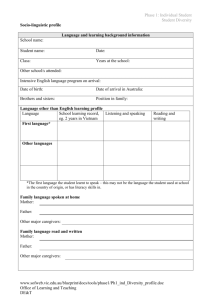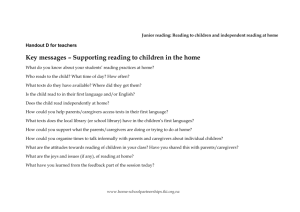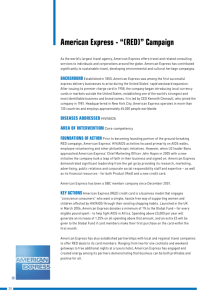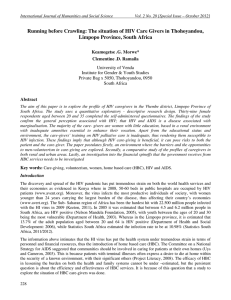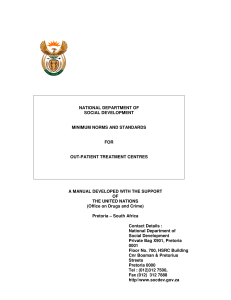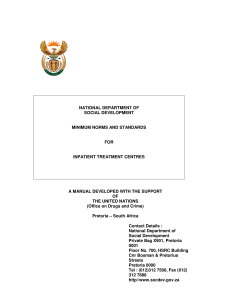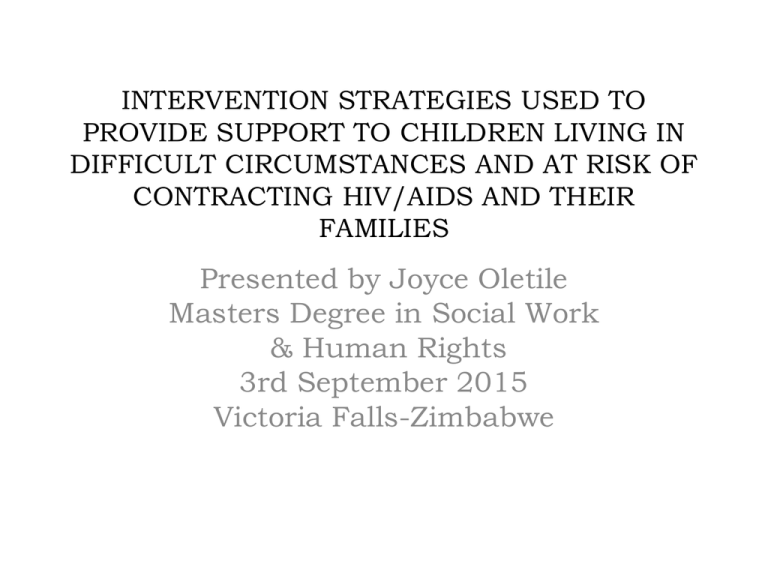
INTERVENTION STRATEGIES USED TO
PROVIDE SUPPORT TO CHILDREN LIVING IN
DIFFICULT CIRCUMSTANCES AND AT RISK OF
CONTRACTING HIV/AIDS AND THEIR
FAMILIES
Presented by Joyce Oletile
Masters Degree in Social Work
& Human Rights
3rd September 2015
Victoria Falls-Zimbabwe
Who are children living in difficult
circumstances & at risk of contracting
HIV/AIDS?
•
•
•
•
•
•
•
Orphaned children
Children living with HIV
Children living with disability
School drop outs
Children living on the street
Children heading households
Neglected children
Life Skills Camps
• Weekend Camps for
children aged 6 to 9 yrs.
• Tree of life tool was used
• Topics discussed covered
childrens rights &
responsibilities, child
abuse, basic facts on
HIV/AIDS,
• Games (playing cards,
netball and football.
• Borne fire in the evening
• Nature tour
• Follow up meetings after
the camp
• Two weeks Camps for
children aged 10 to 14 & 15
to18 yrs.
• Journey of life and Tree of
life tools were used.
• Topics discussed covered
childrens rights &
responsibilities, child
development, adolescent &
sexual reproductive health,
basic facts on HIV/AIDS,
defilement, incest & rape,
child abuse
• Games (netball, football,
volleyball, chess, playing
cards, monopoly, scrabble.
• Nature tour
• Borne fire in the evening
Home Visits
• For both children and their caregivers
• Clients feel comfortable and open in
their own environment.
• Identification and registration of new
clients
• Linking clientele with appropriate
services
• Addressing issues of child welfare and
interpersonal relationships
Childrens Meetings
• Focused on health talks & life skills
• Identifying children who needs help in
different issues e.g school work, social
problems
• Interaction and sharing of ideas with others
• Covered topics on importance of education,
drugs and substance abuse, child abuse,
information on HIV/AIDS, children`s rights
& responsibilities, defilement, incest & rape
• Opportunity to document magnitute of
cases of children in difficult circumstances
Group Counselling
• Children grouped according to
problems they face
• Issues discussed, adherence,
importance of schooling
• Helps children to open up and share
knowing that they are not alone
Parents Meetings
• Aimed at sensitising parents/caregivers on
children`s issues
• Creating a platform for experience sharing
on different issues relating to child and
parental welfare
• Building closer links between caregivers
and service providers
• Discussions covered parental duties and
obligations, children´s rights &
responsibilities, interpersonal relationships
at family level, importance of schooling,
child & social welfare programs for both
parents and children
Parenting Workshop
• Give feedback on life skills camps
• Equip parents with parenting skills
• Platform for experience sharing and
mapping wayforward on children´s
issues
• Build closer links with caregivers
• Update parents/caregivers on current
programs for children & caregivers
• Appraise parents/caregivers on available
services, when and where to seek help
Community Leaders
Workshop
• Project buy in and support
• Sensitisation on legal statutes, acts &
policies
• Appraise them on available services for
children, caregivers and the community
• Referral networks (when & where to refer
cases
• Building relationships and collaboration
in handling childrens issues
Lessons Learnt
• Involvement of community in issues relating to
children helped in referral of cases.
• Home visits helped in identifying magnitude of
problems at community level.
• Usage of local statute- children`s act raised
awareness on the community and participation in
dealing with children´s issues.
• Proximity in project implementation is very
important (time, location)
• Group counselling on people with same problem is
more effective as clients feel more comfortable to
share.
• Collaboration of stakeholders is essential in
implementation of strategies geared towards
helping children
Recommendation
• Interventions should be contextualised
looking at issues of culture and locality
• Meetings for parents to be held after
their working hours
• Children`s meetings to be held after
school to avoid clashing with school
timetable.
Thank You
Ke a leboga

